Another week has flown by, and this time, I’ve got something extremely personal to share.
If you’ve been following my journey, you know running has shaped my life in more ways than I can count. But what you might not know is how much my relationship with food has shaped me too - and not just in the “carb-loading before a race” kind of way.
Lately, I’ve had more and more conversations with close friends who are struggling with fuelling, body image, and self-worth. And the more I open up about my own experience, the more I realize just how many people are navigating the same silent battle.
So, let’s talk about food. Sounds simple, right? You eat, you’re full, you move on with your day. Except, for a while, that’s not how it worked for me. My relationship with food has been a rollercoaster - one of those terrifying ones where you’re upside down for too long, wondering if you’re going to throw up.
The Good Old Days (When Food Was Just Food)
Growing up, food was fuel. No rules, no restrictions - just energy to power my endlessly active life. My parents, both from high performance sports backgrounds, made sure I understood that eating well meant performing well. Meals weren’t just meals; they were pit stops on the race track of life. My dad took the saying “breakfast is the most important meal of the day” so seriously, I’m surprised he didn’t frame it on the kitchen wall.
Every morning before school, he’d wake up early to cook my brother and I a full three-course meal. And when I say “three-course,” I mean a marathon of breakfast foods: a massive bowl of honey oatmeal, followed by fresh, seasonal fruit, finished off with eggs, toast, and sausages (mostly for my brother because, personally, a cylinder of mystery meat at 7 AM never sat right in my stomach).
Afternoons were just as well-fuelled. My mum, the ultimate snack strategist, would pick me up on the way to training with a cooler full of goodies - sushi rolls, a banana, and a sweet treat. And let’s be clear: Bakers Delight finger buns with pink icing are, in my opinion, the pinnacle of Australian cuisine. To this day, I will still argue that sushi is also the ultimate pre-run snack.
Food was never labelled as “good” or “bad” - it was just food.
Even when I moved away for college at Oxford, my relationship with food stayed the same: simple, joyful, and entirely unproblematic. The dining hall was buffet-style, which meant unlimited portions, and yes, that often translated into questionable amounts of chocolate cake before late-night study sessions. No guilt, no overthinking - just good food, good company, and a lot of happy taste buds.
The Slow, Sneaky Shift
Then came life after college. I moved back to Australia, into a share house with two high school friends, right as the world was going into Covid lockdown. Suddenly, I had way too much time on my hands and, like every other bored millennial, found myself deep in the black hole of Instagram and TikTok.
Enter: the at-home HIIT workouts that guaranteed abs in 10 minutes (spoiler alert: they didn't), the “clean eating” trends that made me start eyeing my pantry like it was an enemy territory, and the fitness influencers preaching that less was more (except when it came to their supplement discount codes).
At first, it seemed harmless. I just wanted to be healthier. So I swapped olive oil for coconut oil (because some girl with glowing skin on the internet told me to?). I ditched regular milk for plant-based milk because it had fewer calories (never mind the fact that I love dairy). I cut back on snacks, convinced that hunger was just a mindset. And slowly, without even realising it, I was eating less and less.
What started as “healthy choices” spiralled into something else entirely: restriction, control, obsession. My body was not impressed. My skin freaked out, breaking into rashes that made me look like I had fought a patch of poison ivy and lost. My mum, the voice of reason, dragged me to a doctor, who ran some blood tests. The results? “You have a gene linked to gluten intolerance.” Not an actual intolerance, just a possibility. But did I take this with a grain of salt? Nope. I took it as a divine sign from the universe.
Overnight, I became that person. Pasta? Banned. Pastries? Absolutely not. Pizza? A distant memory. Meanwhile, my friends were living their best quarantine lives, baking banana bread like it was an Olympic sport, while I sat there, proudly hiding behind my “diagnosis” of being gluten-free, convinced I was in control.
At the same time, I had just started running. What began as casual 5K loops with my housemates turned into a daily ritual. And I loved it. The runner’s high, the sense of accomplishment, the feeling of movement - it was intoxicating. I was running more, eating less, getting leaner… wasn’t that the goal?
Spoiler alert: It was not.
When It All Fell Apart
The first red flag came at my first triathlon in Huskisson. Somehow, I ended up on the podium, taking third place. But instead of feeling victorious, I felt like a new-born giraffe - dizzy, wobbly, and one strong gust of wind away from collapsing. I was so undernourished that simply standing upright felt like an extreme sport. But in my mind? This proved that my restrictive habits were working. I mean, I was getting results, right? Clearly, my suffering was just dedication in disguise. So, naturally, I kept going.
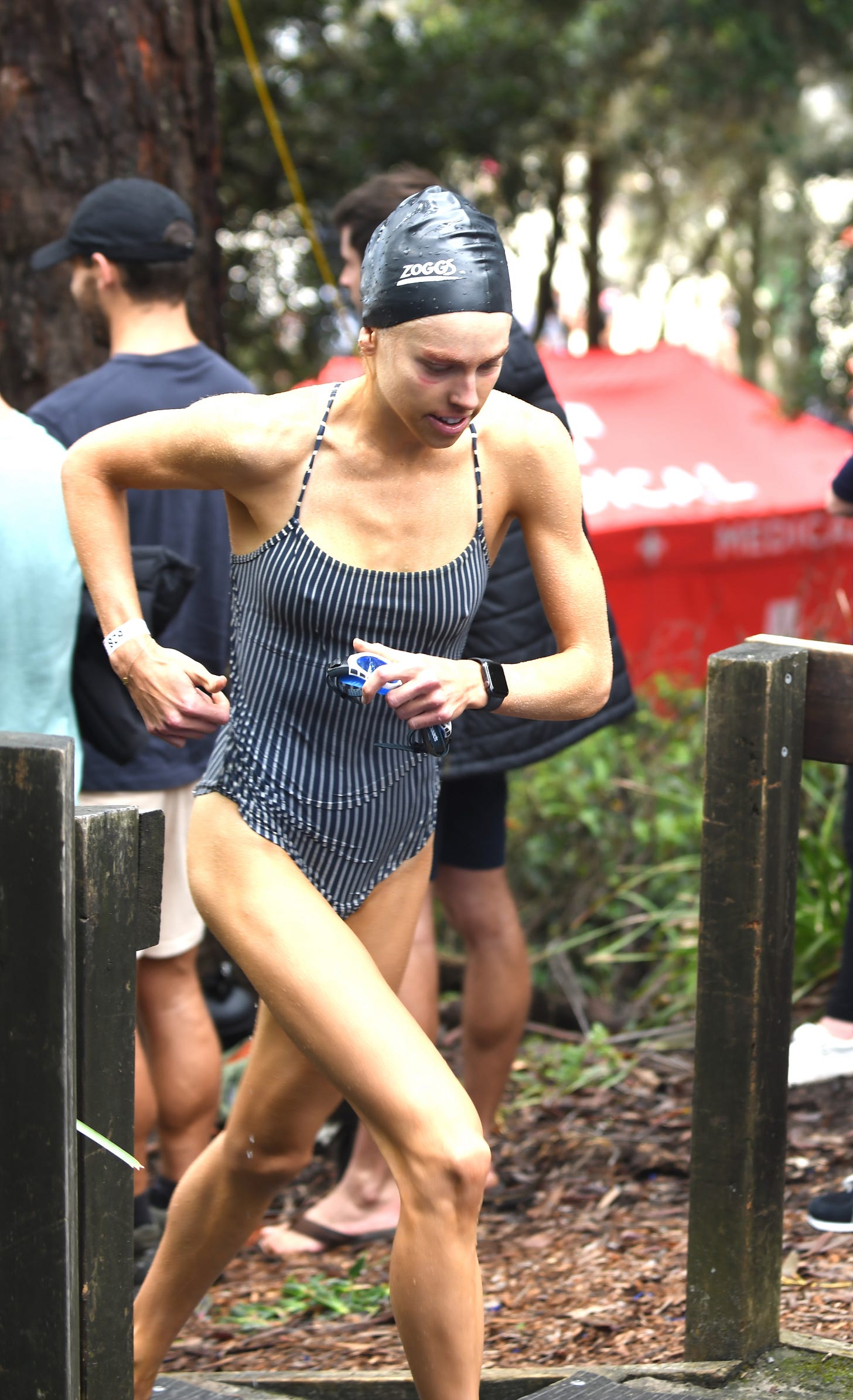
Looking back at photos from that race, I can barely breathe. The cognitive dissonance is overwhelming. I remember at the time being so fixated on my weight - still wanting to be skinnier, convinced that was the key to everything. But when I see those photos now, a deep sadness floods over me for that girl.
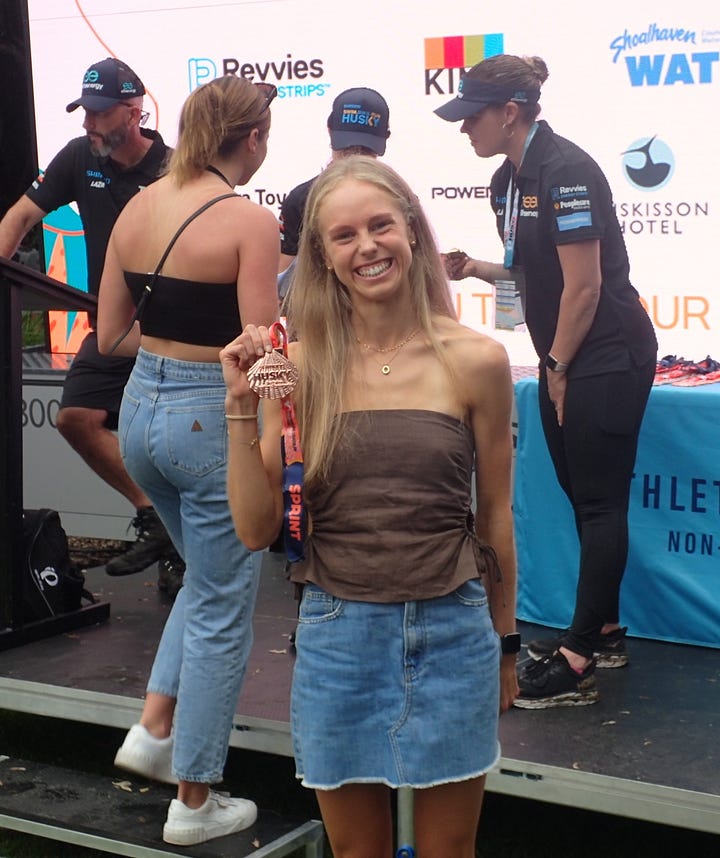
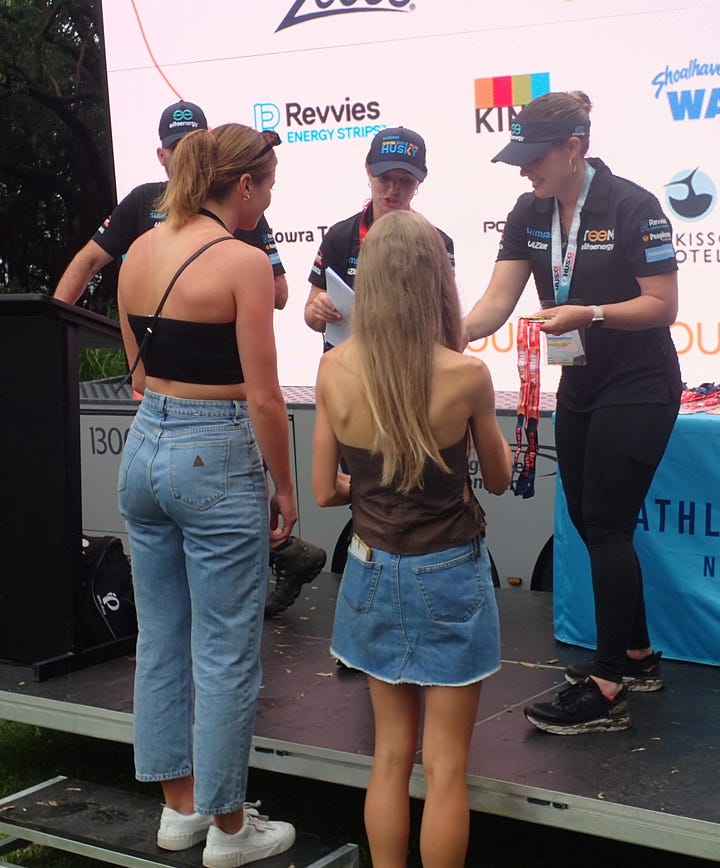
For the longest time, I couldn’t bring myself to call what I was going through an eating disorder. I saw myself as strong, determined, unbreakable. I believed that admitting I was struggling, that facing the reality of my mental health, was a weakness, and in my mind, weakness was something you shoved away, something you didn’t acknowledge. Looking back now, I see that it was never the mental illness that was my weakness - it was the denial. It was hiding from the truth, pretending I didn’t feel the cracks forming underneath me. And those cracks? They were louder than I ever let myself hear, but I kept ignoring it, telling myself I was just “focused on performance.”
Then came the wake-up call.
In the summer of 2022, I joined my first real training squad and headed to a two-week training camp in the Blue Mountains. It was structured, well-planned, and, for the first time, I was running more than ever under the guidance of a coach. My mileage was increasing, but at a safe rate. I felt fantastic. I was thriving. I was pushing my body to new limits, feeling strong, fast, and, dare I say, borderline invincible.
Until my body decided to humble me real quick.
Every Tuesday, we had track sessions in Oberon. On this particular Tuesday, I felt great - ready to tear up the track. I started our usual warm-up, chatting with teammates, feeling on top of the world.
And then … blackout.
The next thing I knew, I was lying on the ground, wrapped in jackets, surrounded by teammates whose faces looked like they’d just seen a ghost. I’d just experienced a 40-minute seizure. The ambulance rushed me to the hospital, where I found out my body had officially hit empty. My ferritin levels were so low they were practically non-existent. I might as well have been running on hopes and dreams, and, unfortunately, those aren’t great fuel sources.
An Easy Disguise
I wish I could say this was the moment everything changed - that I saw the light, embraced proper fuelling, and rode off into the sunset with a baguette in one hand and an ice cream in the other. But… nope. Instead, I made just enough changes to keep people off my back. A banana here, a protein shake there - just enough to look like I was taking care of myself, while still avoiding food in the ways that felt “safe” to me. I didn’t get better at fuelling; I just got better at hiding the fact that I wasn’t.
Eventually, my parents forced me to move back home. They saw where this was heading, and it wasn’t good. But an eating disorder is tricky. You can’t force someone to eat, and unlike a broken bone, the damage isn’t visible. It’s hard to explain a mental illness to someone who hasn’t experienced it.
Learning to Eat Again (Like, Actually Eat)
So what changed?
Getting selected to represent Australia at the World Mountain & Trail Running Championships in 2023 was not only ground-breaking for my career as an athlete, but it also saved my life!
Every night, we ate in a massive dining hall filled with athletes from around the world - the best of the best. And while you’d expect the real competition to be on the trails, I quickly realised it was actually happening at the buffet line. Plates were stacked high, mountains of pasta disappeared in record time, and I found myself wondering “are we preparing for a championship race or an eating contest?”
Meals were buffet-style, but with a twist: we didn’t get to serve ourselves. That meant zero control over portion sizes. The only choice? Whether or not to go back for seconds (or thirds, if you were feeling particularly ambitious). At first, this lack of control freaked me out. But then, something weird happened - for the first time ever, I wasn’t self-conscious about eating too much. Instead, I was worried about eating too little.
My mindset started shifting. The conversations around me still included numbers, but no one was talking about calories or macros. Instead, it was all about making sure we were eating enough. Enough carbs, enough protein, enough glycogen stored to actually perform. The biggest concern wasn’t about ruining a six-pack - it was about not hitting the wall at 30K.
And then it hit me: I had been training with the handbrake on.
The more I fuelled properly, the better I felt. And not just in running - my brain started working again. When you’re starving yourself, your mind is running on fumes. I used to get such intense brain fog that I’d be mid-conversation and completely blank on what the other person had just said. But now? I could actually think again. Turns out, food isn’t just for muscles - it’s also helpful if you’d like to, you know, have a functioning brain.
That trip was the most freeing experience of my life. I ate ice cream after dinner for the first time in two years (granted, it was one scoop, after a 45K race, but hey, progress is progress). Now, ice cream is a post-race tradition, not just to celebrate my performance, but to celebrate how far I’ve come.
Where I’m At Now
I won’t pretend I’ve got it all figured out. Some days, that little voice in my head still tries to critique my plate. Some foods still feel like a mental hurdle.
But here’s what I know now: food isn’t the enemy. It’s not something to fear, control, or earn. It’s life. It’s strength. It’s the difference between merely existing and truly living.
Two years ago, I was trapped in a mindset that was slowly destroying me. Now, I’m fuelling for performance, not punishment. I’m training my body to go further than I ever thought possible. I’m stronger, faster, and, most importantly, happier. Not because I weigh less, but because I live more.
I’ve also gone full nerd on nutrition. As a former financial analyst, numbers have always been my thing - except now, instead of tracking stock prices, I’m tracking carbs per hour. I use Precision Fuel to make sure I’m actually giving my body what it needs to perform. And here’s the wildest part: I’m actively trying to eat more. If you had told me that two years ago, I would have laughed (and then probably gone for a run to “burn it off”).
So, if you’re in that place right now - if you’re stuck in the cycle of restriction, of fear, of believing you’re only worthy when you take up less space - please, please hear me: you deserve more. More food, more energy, more freedom, more joy. You deserve to take up space. You deserve to live.
I was so scared to share this part of my story. But if it reaches even one person, then it will have been worth it. Because life is so much bigger, brighter, and fuller when you finally stop running on empty.
And trust me - you are strong enough to choose more.




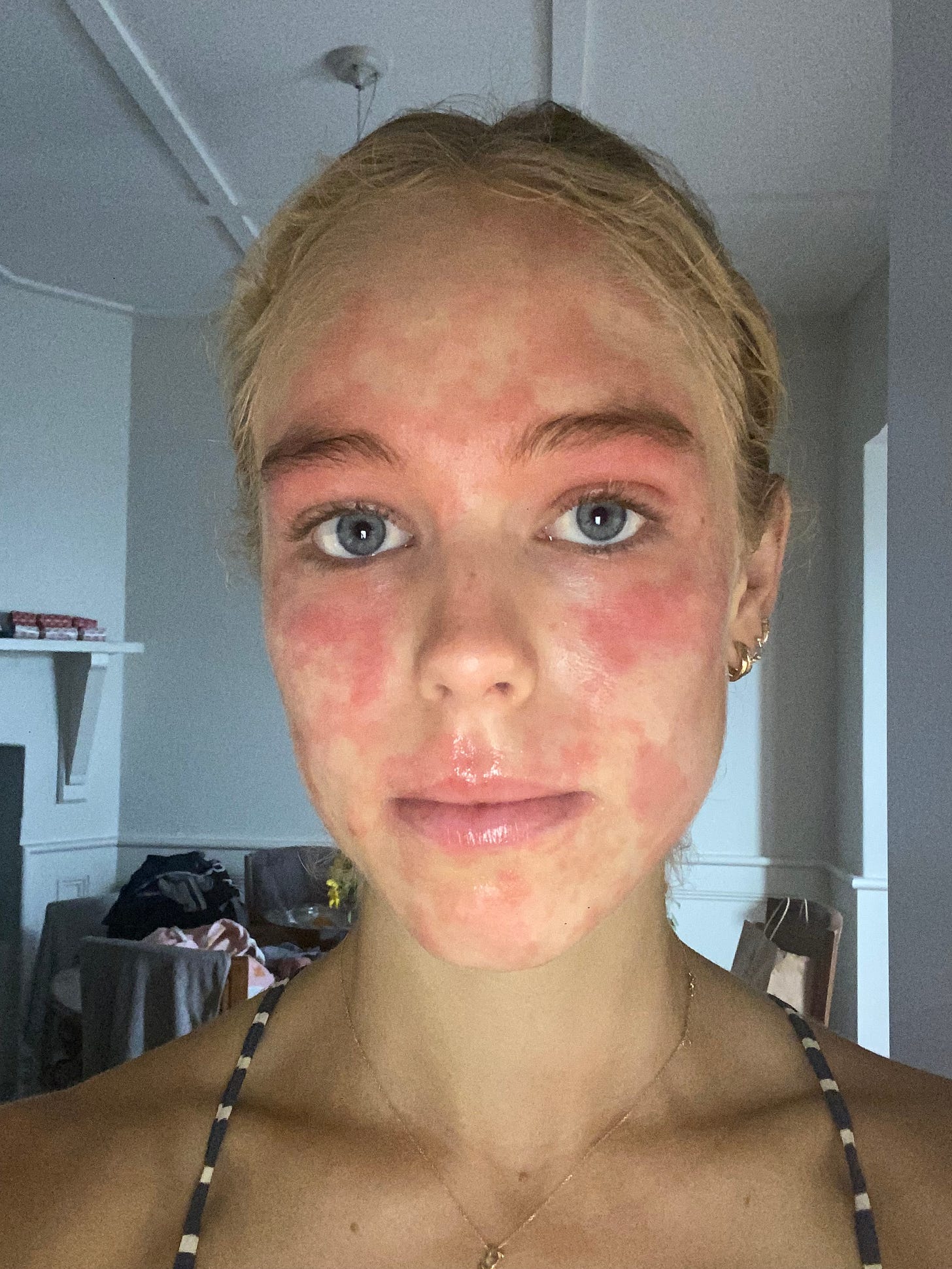
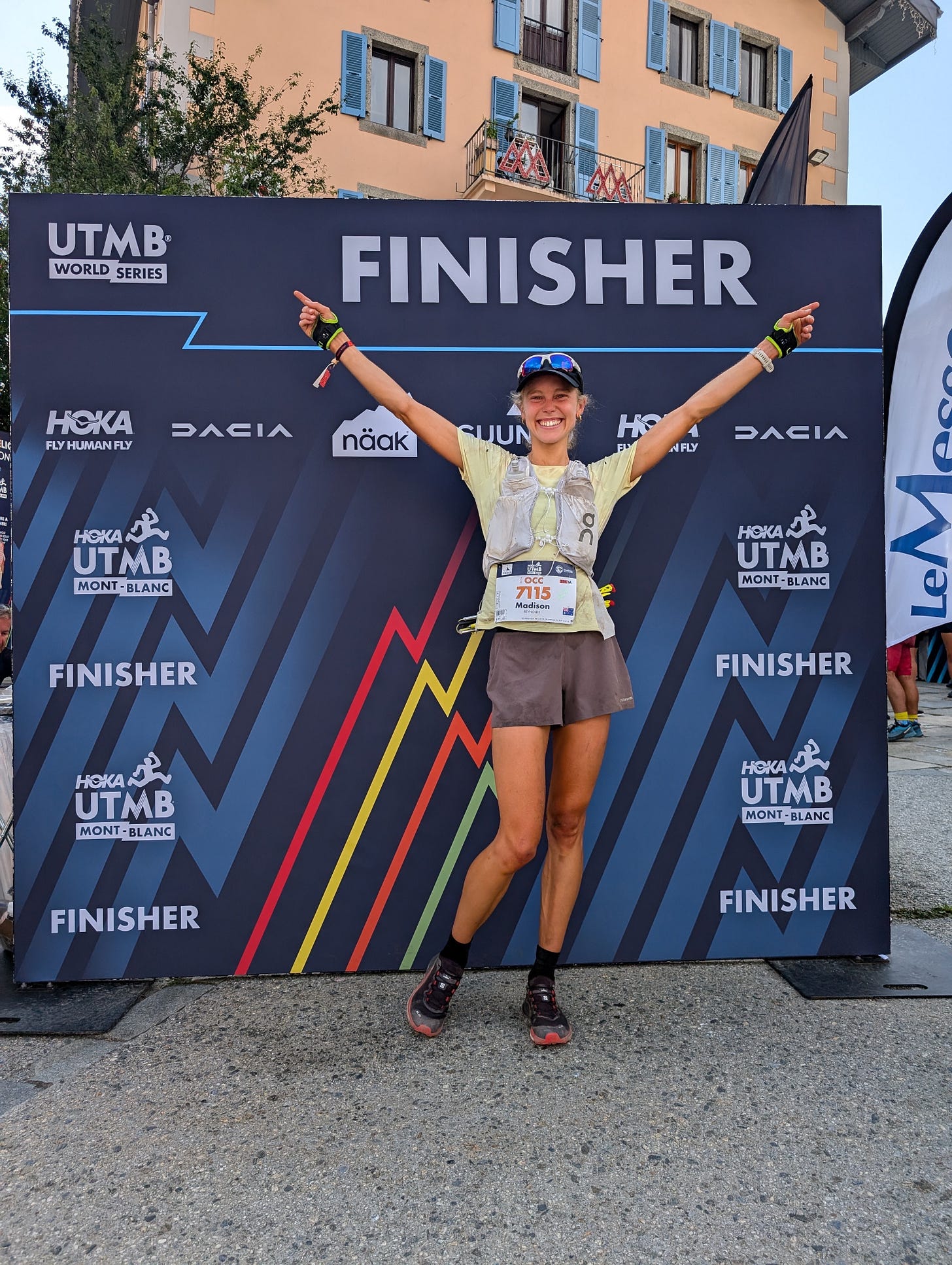
Thank you for putting that out there. Well done ♥️
You are awesome <3